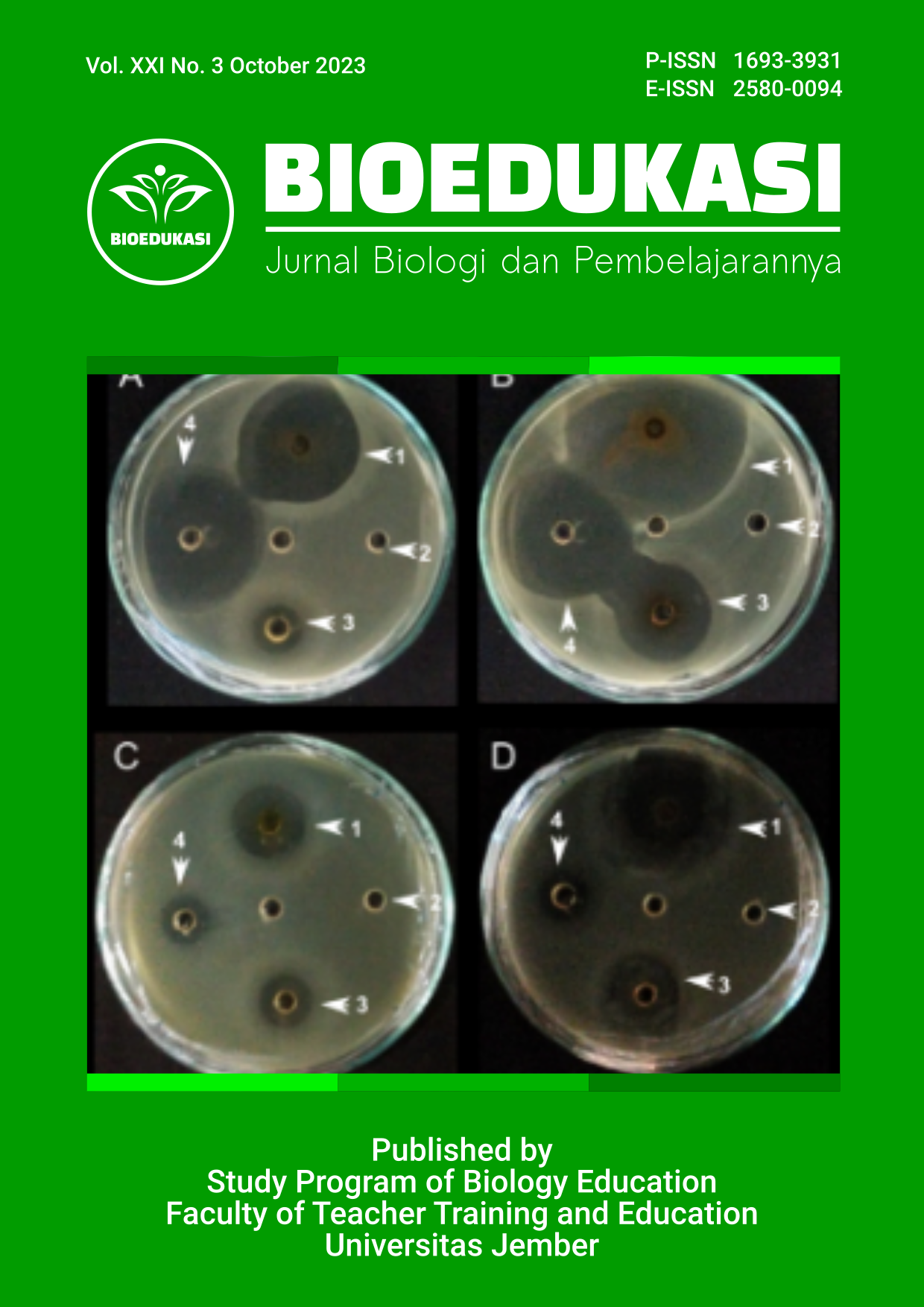Development of Online STEM Learning Program for the Preparation of Prospective 21st Century Biology Teacher
DOI:
https://doi.org/10.19184/bioedu.v21i3.40383Keywords:
21st century abilities, Online STEM Learning, Program, STEMAbstract
The development of online STEM (science, technology engineering and mathematics) learning programs for prospective Biology teacher students is essential because STEM education can provide several necessary skills needed by biology teachers in the future. This research aims to produce an online STEM learning program by utilizing existing resources around the school. The research method used in this study is a mixed method with a research design: Embedded Experimental Model. Several biology education students (n= 15) were involved in this research. The research began with a preliminary study, drafted a STEM learning program, and developed and implemented a STEM learning program. The instruments used in this study were: learning program assessment sheets, textbook assessment sheets, STEM concept understanding tests, student participation assessments, product assessments, communication skills assessments, EDP assessment rubrics, teaching device assessment rubrics, project assessment rubrics, manufacturing assessment rubric learning videos, online learning observation sheets, and learning observation sheets. Prior to use, all instruments were validated by colleagues and experts. The results of the validation show that, in general, the online STEM learning program and its accessories are suitable for program testing. In terms of the programs being developed, they are effective in improving the abilities of 21st-century biology teacher candidates, and this can be seen from the N-gain score; of 06 obtained. The results of this effectiveness test indicate that the developed learning program can improve the 21st-century abilities of prospective biology teacher student.
Downloads
References
Li, Y., & Xiao, Y. (2022). Authorship and topic trends in STEM education research. International Journal of STEM Education, 9(1). https://doi.org/10.1186/s40594-022-00378-4
Li, Y., Xiao, Y., Wang, K., Zhang, N., Pang, Y., Wang, R., Qi, C., Yuan, Z., Xu, J., Nite, S. B., & Star, J. R. (2022). A systematic review of high impact empirical studies in STEM education. International Journal of STEM Education, 9(1), 1–18. https://doi.org/10.1186/s40594-022-00389-1
Lidi, M. W., Daud, M. H., & Program, E. S. (2021). Project-based learning based on local wisdom through google classroom to improve process skills in pandemic times. Bioedukatika, 9(3), 169–178.
Ridwan, A., Fatimah, C., Hadinugrahaningsih, T., Rahmawati, Y., & Mardiah, A. (2022). Development of 21 st Century Skills in Acid-Base Learning Through STEAM Projects. JTK: Jurnal Tadris Kimiya, 7(1), 121–134.
Setiono, S. (2021). Analisis Respon Mahasiswa dalam Pembelajaran Online Berbasis Aktifitas di Perguruan Tinggi. Jurnal Pendidikan, 9(2), 15–23. https://doi.org/10.36232/pendidikan.v9i2.1095
Sutaphan, S., & Yuenyong, C. (2023). Enhancing grade eight students’ creative thinking in the water STEM education learning unit. Cakrawala Pendidikan, 42(1), 120–135. https://doi.org/10.21831/cp.v42i1.36621
Wahono, B., Hariyadi, S., & Subiantoro, A. W. (2022). The development of an online STEM teacher professional development package with the DECODE model: An innovative teacher’s quality maintenance. Eurasia Journal of Mathematics, Science and Technology Education, 18(12). https://doi.org/10.29333/ejmste/12647
Yılmaz, Ö., & Malone, K. L. (2020). Preservice teachers perceptions about the use of blended learning in a science education methods course. Smart Learning Environments, 7(1). https://doi.org/10.1186/s40561-020-00126-7
Zakeri, N. N. binti, Hidayat, R., Sabri, N. A. binti M., Yaakub, N. F. binti, Balachandran, K. S., & Azizan, N. I. binti. (2022). Creative methods in STEM for secondary school students: Systematic literature review. Contemporary Mathematics and Science Education, 4(1), ep23003. https://doi.org/10.30935/conmaths/12601
Zein, L. S. H., Setiono, S., & Windyariani, S. (2022). Pengaruh Pendekatan STEMA Terhadap Kemampuan Berpikir Kreatif Peserta Didik Kelas VIII SMP Pada Materi Sistem Pencernaan. Biodik, 8(2), 90–102. https://doi.org/10.22437/bio.v8i2.16990




 https://orcid.org/0000-0003-1920-0515
https://orcid.org/0000-0003-1920-0515